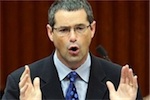 On Friday I was interviewed about Twitter’s latest quarterly results by ABC Radio’s lunchtime national current affairs program, The World Today — and in particular the potential future impact of bullying and trolling. And here’s the result.
On Friday I was interviewed about Twitter’s latest quarterly results by ABC Radio’s lunchtime national current affairs program, The World Today — and in particular the potential future impact of bullying and trolling. And here’s the result.
“Twitter CEO admits cyber bullying poses threat to revenue growth,” was the story’s headline, and this is how presenter Peter Lloyd introduced it:
“The social media giant Twitter is being been forced to confront a serious threat to its profitability – cyber bullying. In internal emails leaked to a news website, the Twitter’s CEO says he ashamed of his company’s handling of bullies. Dick Costolo says harassed users are abandoning the service and as part of the quarterly financial results announcement overnight, Twitter reported disappointing user growth in the final three months of last year.”
The reporter was Pat McGrath.
Podcast: Play in new window | Download (1.9MB)
The audio is ©2015 Australian Broadcasting Corporation. The audio is being served directly from the ABC website, where you can also read a transcript.

 The online bullying of TV presenter Charlotte Dawson and the subsequent calls for an end to online anonymity was the topic for my spot on
The online bullying of TV presenter Charlotte Dawson and the subsequent calls for an end to online anonymity was the topic for my spot on 